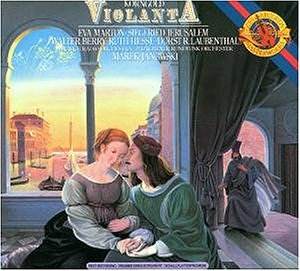Violanta was Korngold’s second opera, composed
after the comedy "Der Ring des Polycrates" when
the composer was only 17 years old. It was given a double bill
premiere with Der Ring in 1916 at the Munich Court Theatre
under Bruno Walter, with Maria Jeritza in the title role.
The libretto, by Viennese playwright Hans Müller,
has definite echoes of verismo. The opera is set during
the Renaissance, in the Venetian Republic. Simone, military commander
of the Republic is married to the beautiful Violanta, who has
sworn revenge against Alfonso, Prince of the Republic. Violanta’s
sister, Nerina, committed suicide after being seduced by Alfonso.
Violanta’s plan is to lure Alfonso from the Carnival into her
quarters, then have him killed by Simone, after being promised
that his marital privileges will resume once Alfonso is dead.
Once Alfonso is in Violanta’s quarters, she realizes that she’s
in love with him as Alfonso is with her. She hesitates to give
Simone, who is hiding, the signal to come out and kill him. Simone
becomes impatient and comes out, finding the lovers in embrace.
As Simone is about to strike Alfonso, Violanta gets in the way,
receiving the blow and dying in Simone’s arms.
Here we have a marvellous example of how the
young prodigy achieved his distinctive style at this early age.
The usual description given to Korngold’s music, as made of elements
of Richard Strauss and Giacomo Puccini, while being for the most
part only a useful pointer, applies here perfectly. However, as
with all generalizations, it does not give the whole story. Yes,
the combination of rich orchestration and beautiful melodies is
there; but listen, for example, to the Vorspiel where the very
first mysterious chord is played in arpeggio by pretty much the
whole orchestra, which then transforms into the main motif, played
in tutti: Pure and unmistakable Korngold.
There are other wonderful moments in the opera,
including the duet between Violanta and Alfonso; a Tristan-esque
affair that, in my humble opinion, has a sense of forward movement
that the Bayreuth master only achieved in "Die Meistersinger".
Let’s now talk about this recording. It is, to
my knowledge, the only recording of this opera. The Munich Radio
Symphony Orchestra - the same one that recorded with Erich Leinsdorf
the classic 1975 premiere recording of "Die Tote Stadt"
- is, as in that recording, in wonderful form. The clarity and
power of the brass, the richness of tone of the strings and the
clarity of the woodwinds put it in the same class as the best
in the world.
Marek Janowski’s pacing of the score is very
appropriate. It doesn’t feel rushed at all, letting the inner
drive of the music provide the impetus. This is something that
I feel is critical to let Korngold’s music shine; Erich Leinsdorf
in his Tote Stadt feels at times rushed. Listen instead
to the Leif Segerstam recording of the same opera on Naxos; while
there are many controversial points with his interpretation, his
pacing sounds ideal. Janowski seems to agree in his approach to
Violanta.
Walter Berry, in this recording is beginning
to show a bit of strain, but, for the most part, his voice is
a rich as ever. On the other hand, Eva Marton in the title role
is at the height of her powers, handling the difficult role with
aplomb. Siegfried Jerusalem, although an acquired taste for many,
as Alfonso, has the right qualities for a role that is not very
dissimilar to that of Siegmund in vocal requirements.
The recorded sound is excellent, spacious, with
great balance between the singers and orchestra. This is a 1980
analogue recording; by then, the art of recording by analogue
means had reached a pinnacle. It can be said that by then it was
perfected. Along with this release, other releases of the late
1970s, early 1980s era, like Solti’s "Hansel und Gretel"
and parts of his Mahler cycle, show how far the technology had
progressed. The SPARS code for this release is ADD, indicating
that re-mastering took place, although no information about it
is provided.
A libretto in the original German is included,
along with translations to English and French. The very useful
and informative notes include a short biography of Korngold, a
history and description of the opera and analytic commentary,
all written by Christopher Palmer. The introduction is written
by none other than Karl Böhm, reminiscing about hearing the
opera for the first time and his experiences while coming in contact
with the Korngolds. An introduction by Vienna State Opera executive
producer Marcel Prawy is also provided.
In conclusion, a great recording of a great opera
that is well worth tracking down. This is a must not only for
Korngold fans, but to admirers of late-romantic German opera.
By virtue of being the only recording, it is THE reference recording,
but it’s hard to think that it could have trouble holding that
place against possible new recordings. Still, record companies,
please keep them coming!
Victor Martell
